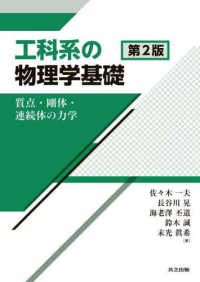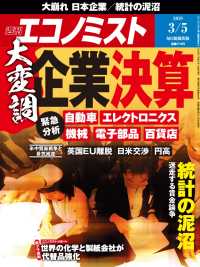- ホーム
- > 洋書
- > 英文書
- > Business / Economics
Full Description
This is an open access title available under the terms of a CC BY-NC-SA 3.0 IGO licence. It is free to read at Oxford Scholarship Online and offered as a free PDF download from OUP and selected open access locations
International development cooperation plays a key role in promoting social, economic, and political progress and wellbeing in developing countries. Yet, it has long been clear that the effectiveness of aid is most challenging in countries with weak institutions. It is estimated that by 2030 around a fifth of the world's poorest people will live in fragile and conflict-affected countries. Despite increased attention, much more needs to be done to maximize the effectiveness of aid in these highly complex situations.
This book offers fresh, in-depth understandings of the effectiveness of development cooperation in fragile contexts, and where challenges regarding the effectiveness of development cooperation are most pronounced. The empirical chapters combine quantitative macro analysis of cross-country data with detailed country case studies to take stock of past research on the topic, investigate the impact of foreign aid in fragile state contexts, and explore whether and how aid delivered in accordance with the principles of effective development cooperation works in these settings. Cross-national studies provide a broader picture of the topic, while country case studies allow us to identify specific ways in which development cooperation operates. More reflective chapters discuss the feasibility of the effectiveness agenda and provide important insights on how the effectiveness principles could be improved and better put into practice.
The collection offers important original contributions to a large body of policy-relevant scholarship on the aid-development nexus, as well as to rapidly evolving research and policy debates on building strong and inclusive state institutions.
Contents
PART I: INTRODUCTION
1: Rachel M. Gisselquist, Patricia Justino, and Andrea Vaccaro: Development cooperation under fragility: Evidence from across the globe
PART II: WAYS FORWARD IN WEAK STATES AND CONFLICT SITUATIONS
2: Christoph Zürcher: What aid works (or not) in highly fragile states? Evidence from Afghanistan, Mali, and South Sudan, 2008-21
3: David Carment and Yiagadeesen Samy: Fragile states in an era of geopolitical rivalry, pandemic and war: Insights from the Country Indicators for Foreign Policy
4: Anke Hoeffler: Can aid reduce violence?
PART III: OWNERSHIP AND SOCIAL CONTRACT IN WEAK STATES AND CONFLICT SITUATIONS
5: Debapriya Bhattacharya, Towfiqul Islam Khan, and Najeeba Mohammed Altaf: Southern perspectives on effective development cooperation: rethinking country ownership
6: Jennifer Brick Murtazashvili: Rethinking the relationship between community-driven reconstruction and the social sciences: lessons from Afghanistan
8: Gaël Raballand, Deborah Isser, Hodan Hassan and Mathieu Cloutier: Why is it important to use a social contract lens for donor interventions in Somalia
8: Malin Hasselskog, Vedaste Ndizera, and Joakim Öjendal: Local participation in the context of national ownership: The playing out of aid nurtured ideals in Rwanda and Cambodia








